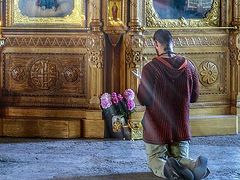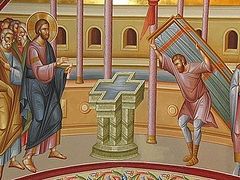In difficult life circumstances we often have to select from two or more evils. Can a choice like this be based on Christian principles? By what should we be guided and to what should we pay attention when we make such choices?
Whether to go to church or to my country cottage?
As Christians we all understand that in order to draw closer to God we must do good works, which are the school of observing the commandments of Christ for us. For all that, we constantly face difficulties and get confused, unable to decide what to do—even in seemingly trivial situations that concern our faith and life in the Church.
Here is a typical and very common example: A religious woman wants to go to church on Sunday, and her non-religious husband (who has with some effort reconciled himself to the fact that his wife reads the Gospel, prays and observes fasts) strictly forbids her to go anywhere during the weekend when he has his only chance to stay at home. In such cases religious wives (or sometimes religious husbands) ask themselves: “What should I do?” It is a classical situation of choosing the lesser of two evils.
But they take a wrong approach when they attempt to find a definite answer once and for all. According to Abba Dorotheos of Gaza, if we have to choose between two goods, we must opt for the greater one with prudence, and when we have to select from two evils we must choose the lesser one. And it is impossible to define theoretically what is the lesser evil—it becomes clear in the context, when the situation has already been revealed to us and we look at all of its circumstances wisely.
A religious husband or a religious wife wants to go to church. If it is clear that the situation is coming to a bitter quarrel, then I think they had better stay at home—and it will be a Christian choice. It would be advisable to make concessions to their other halves (even if they were going to take Communion), if they feel that it may lead to a crisis that will ultimately destroy their families. But they should take into account that I am talking about the relationship, though imperfect, between spouses who love each other. If a spouse uses going to church as an excuse for arguments and separation, that is another story and another question—whether or not this marriage can be saved.
Should I hold my tongue for the good of others?
Abba Dorotheos also said that in some situations we are allowed to conceal the truth—and that will be choosing the lesser evil as well. It applies to the situations when our words may lead to a far greater evil than our silence.
For instance, we know that the wife of one of our acquaintances is unfaithful to him. Is it our Christian duty “to open the eyes” of the aggrieved party? I believe that in this case our duty is different—we need to ask ourselves: “Who am I to ruin the peace between these people?” Sometimes people are too self-confident, thinking that they know someone else’s situation, thoughts, and life perfectly well. As outsiders, we may think: “He is unfaithful to her, so he is likely to leave her soon”, whereas in reality it may have been the only mistake that this person ever committed—he had already realized it, repented and decided never to repeat it again by the time we appeared with our “truth”. And no one would have ever learned about this, but because of us the consequences will be irreversible, the family will fall apart and their children will suffer. Sometimes people justify themselves assume that the Lord Himself has destroyed this marriage through their own mouths. But God doesn’t destroy—it is we who destroy.
What is more correct or what is easier?
Choosing between two evils always requires our Christian courage, even more courage than is needed for acquiring one or another virtue. Why? Because virtues are always associated with joy or comfort. For example, we didn’t want to pray because we were tired; but we overcame our fatigue and performed our prayer rule—and many of us know that we have a light heart and feel so good after praying. Although we have not performed any great feat [podvig in Russian], we have done what we were expected to do and we feel as if our wings have grown! As for choosing between two evils, even if our choice is reasonable and correct, we feel no consolation. And we should be firm in our faith to act according to our spiritual reasoning instead of choosing what is easier or what our emotions suggest to us. And it should be said that selecting the lesser evil often entails great difficulties. But the easiest way is to avoid any choice and thus relieve ourselves of responsibility. However, it doesn’t become Christians to act that way—we shouldn’t run away and hide from the situation the Lord has put us in or in which we have found ourselves due to our rash actions. And if we realize that we will have to endure a little without avoiding our responsibility, then we should be ready to keep our patience.
In connection with this I cannot help but recall an episode from the life of Metropolitan Benjamin (Fedchenkov), a wonderful spiritual writer, ascetic and personality. After the October Revolution he lived as an émigré for several years and found himself in a very difficult situation for his ministry. We know that it was then that the Russian Orthodox Church Outside Russia was established, and a disagreement between it and the Moscow Patriarchate arose. Metropolitan Benjamin had to choose between two paths, and it would have been easier and more natural to become a hierarch of ROCOR. But in order to make a final decision he undertook a spiritual labor by praying fervently for forty days and celebrating the Liturgy daily for the same period. He didn’t care about the easiest way, but he cared about the lesser evil and the greater good. After the forty days he took a firm decision: to remain under the omophorion of the Patriarchate of Moscow. When he revealed his decision during an assembly of the clergy, he was nearly “dragged through the mud”. His Eminence remained absolutely alone at that point, and it was very hard to bear this. But there was inner clarity in his soul which helped him withstand it. This clarity was based on the fact that under those circumstances, in those troubled times he didn’t yield to temptation and didn’t take the path of least resistance. All that he sought was the will of God.1
In order to make difficult choices consciously we should learn to discern these situations (that require choice between alternatives) in our lives for a start. It would sound somewhat strange, but sometimes it occurs this way. Someone comes to confession and says, “The circumstances were such that… It so happened that…” And it is often hard for me to explain to him that it didn’t “just happen this way”, that all those events took place not without his participation, his involvement, that the events concerned him and not someone else and that he took choices, but he was so careless he didn’t notice this. And, at first glance, though it seems we don’t face such situations, we should look at our own lives more closely all the same.
Following in the footsteps of Buridan’s donkey2
I would like to dwell on the second saying of Abba Dorotheos that if we have to choose between two goods, we must opt for the greater one. In fact, when two beneficial things collide, they may make our lives miserable if we let things drift. Perhaps the most famous allegory on this subject is Buridan’s donkey. This donkey died of hunger between two bundles of hay, unable to choose between the two.
Sometimes similar things happen to people as well. Say we got two job offers, each having its own advantages. I believe many of us know people who, having found themselves in such a situation, got so worked up from hesitation that they would ultimately decide to decline both offers and wait for something else, thus losing both opportunities. It may be very unreasonable and unjustified, so from the start you should prepare yourselves to make your own choices and take responsibility for them. It is very important.
If our life experience is not sufficient for us to make a choice of this kind with certainty, if we pray, but don’t come to a clear conclusion in our hearts, we could try a simple exercise. It is logical by nature, and many people know about it, but not many are ready to apply it properly without being insincere with themselves. You should take a sheet of paper, draw a vertical line in the center, and write arguments for and against your particular decision in the right and left columns. Then consider what is written there, not from the point of potential gain, but think about what will bring more benefit to your soul, and what will bring less. And you may be surprised to realize that in a situation which appeared to be quite complex, you often discover: here’s the way that would bring me more benefit.
For example, here are two jobs: one is more prestigious and pays more, and the other is more modest, but it leaves us more time for ourselves. Are Christians obliged to choose the modest one? Not necessarily. It depends on the circumstances they live in, on whether there are people who depend on them financially, their professional skills and capacity for work. But what matters is that we will assess the whole “package” differently than an non-religious person. Above all else we would choose the one that will allow us to carry out the Christian service to which we are all called—that of love, first for our nearest and dearest, then for our neighbors.
And one more point: if some situation catches us unawares, we often rush to seek out advice from other people. If we do it in a state of confusion, without having first regained our inner balance, and proceed to ask one person and then another, then these bits of advice, which may well differ or even contradict each other, will only make our confusion worse. There are people who, once faced with a problem, turn to a priest, then to another priest, then still another, ultimately not heeding the advice of any of them, and feeling disappointed because they expected all the priests to give them the same advice. Actually, giving positive advice to people who expect that someone else will effect a change in them and make decisions for them is very difficult indeed. And it is even less likely that they will properly understand what is being said. But for people who are ready—to pray, to endure, to act—a single piece of advice could be enough. They come to their spiritual father, or a priest they go to confession to, and whom they trust, and discuss their problems with him.
The more often we verify our actions in day-to-day circumstances against the Gospel commandments, and consider whether these are in keeping with the spirit of the Gospel, the less hesitant we will be in seriously perplexing situations. And if you try living this way, the need to make decisions will never catch you unawares like an enemy that catches a sleeping soldier in a dawn raid.






